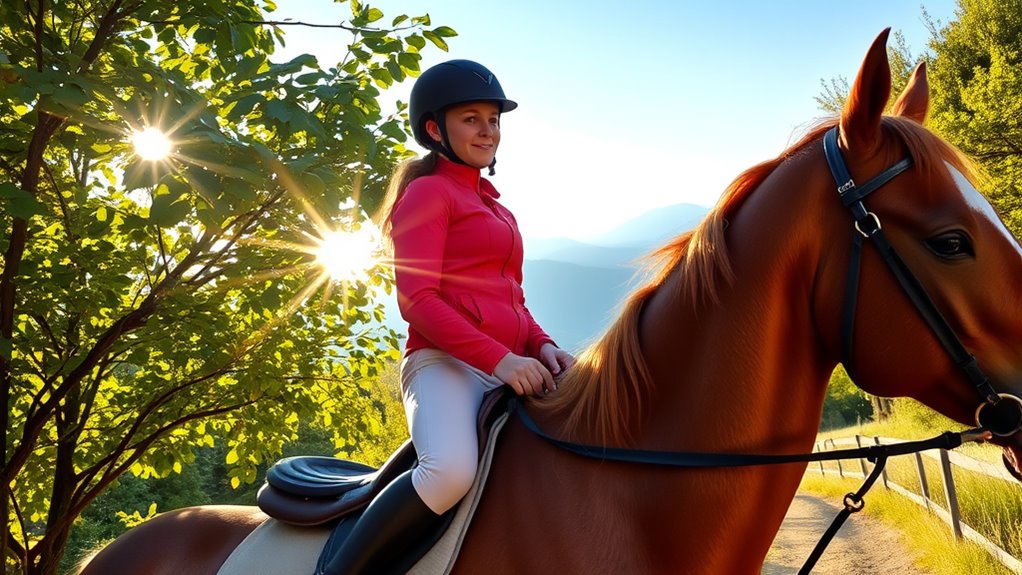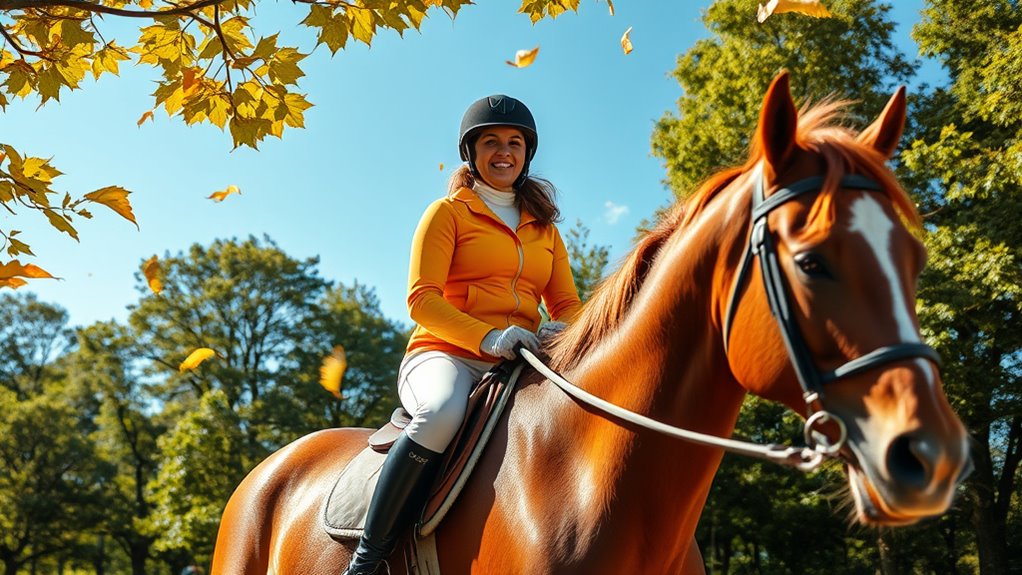When returning to riding after illness, it’s important to verify your vaccinations are current and consult your veterinarian for guidance. Start with gentle rides, taking regular breaks, and monitor how you feel. Progress gradually, paying attention to fatigue and any discomfort. Patience and a structured plan help rebuild strength and confidence safely. If you want to learn more, you’ll find useful tips to make your recovery smoother and keep both you and your horse healthy.
Key Takeaways
- Ensure all vaccinations, especially tetanus and influenza, are current before resuming riding.
- Start with short, gentle rides and gradually increase intensity, monitoring for fatigue or discomfort.
- Consult your veterinarian or healthcare provider to develop a structured, individualized reintroduction plan.
- Keep a journal of rides to track progress and adjust activity levels based on recovery responses.
- Prioritize patience, mental confidence, and overall health to ensure safe and sustainable reintegration into riding.

Recovering from an illness can be a challenging process, but returning to riding safely is imperative for your health and confidence. Before you hop back into the saddle, it’s important to consider your overall recovery progress, especially in relation to your vaccination schedules. Making sure you’re up-to-date on vaccines, like tetanus or influenza, can help protect you from common equine-related illnesses and prevent setbacks. Check with your healthcare provider or veterinarian to confirm your vaccination status and determine if any boosters are needed before resuming riding. This proactive step not only keeps you safer but also reinforces your commitment to your health and well-being.
Ensuring your vaccinations are current helps protect your health and supports safe riding recovery.
As you plan your return, focus on fatigue management. Illness often leaves you feeling drained and less resilient, so pacing yourself is critical. Don’t rush into long rides or intense training sessions right away. Instead, start with short, gentle rides, paying close attention to how your body reacts. Rest becomes just as important as activity, especially if you’re still recovering. Incorporate regular breaks during your rides, and listen to any signs of exhaustion, dizziness, or discomfort. Managing fatigue effectively helps prevent overexertion, which can prolong recovery or lead to setbacks. Remember, patience is key—your body needs time to regain strength and stamina.
It’s also wise to consult with your healthcare provider or veterinarian before returning to riding. They can offer tailored advice based on your specific illness and recovery status. They might recommend a gradual reintroduction to physical activity, emphasizing the importance of not pushing too hard too soon. Following a structured plan minimizes the risk of relapse or injury and ensures your return is sustainable. Keep in mind that your mental state is just as important as your physical health. Feeling confident and relaxed will make your riding experience more enjoyable and less stressful, which in turn supports your overall recovery.
Finally, track your progress as you ease back into riding. Keep a journal of your rides, noting how you feel physically and emotionally. This record can help you identify patterns and adjust your pace accordingly. Celebrate small milestones, like completing a ride without fatigue or discomfort, to boost your motivation. Returning to riding after illness is a gradual process, but with proper attention to vaccination schedules, fatigue management, and listening to your body, you’ll rebuild your strength and confidence safely. Remember, your health is the foundation of your riding journey—take it one step at a time. Incorporating psychological principles such as patience and self-awareness can significantly enhance your recovery experience.
Frequently Asked Questions
When Should I See a Doctor Before Riding Again?
You should see a doctor before riding again if your symptoms persist or worsen, even after a few days. Also, consult a doctor if you’re unsure about medication effects or experience side effects that could impair your riding ability. Your health and safety come first, so getting professional advice guarantees you’re fully recovered and fit to ride. Don’t risk further injury or complications—see a doctor when in doubt.
How Can I Tell if I’M Fully Recovered?
You’ll know you’re fully recovered when post-illness fatigue lifts like a heavy fog and you feel energized and steady. Trust your mental readiness—if your mind feels clear and focused, and your body responds without strain, you’re likely ready to ride again. Take it slow, listen to your body’s signals, and don’t rush—recovery is a journey, not a race. If doubts linger, consult your doctor.
Are There Specific Illnesses That Are More Dangerous for Riding?
Certain illnesses, like respiratory infections or those causing fever, are more dangerous for riding. You should exercise precautions and wait until your illness severity diminishes before getting back in the saddle. Riding too soon can worsen your condition or cause injury. Always listen to your body, consult your doctor if unsure, and guarantee you’re fully recovered to avoid setbacks or complications. Your safety and health come first.
What Precautions Should I Take During Recovery?
You might feel like a fragile glass about to shatter, but with proper precautions, you’ll bounce back stronger. Focus on hydration strategies to keep your energy steady and prevent fatigue. Prioritize mental readiness by gradually easing into riding, listening to your body, and avoiding overexertion. Rest adequately, eat nourishing foods, and consult your doctor before returning. These steps guarantee a safe, confident comeback that keeps you riding at your best.
How Long Should I Wait After Symptoms Disappear?
You should wait at least a week after symptoms disappear before resuming riding. During this time, focus on exercise timing by gradually increasing activity levels, and keep monitoring your symptoms closely. If you experience any lingering fatigue or new symptoms, hold off on riding and consult your healthcare provider. Listen to your body and prioritize rest to make certain of a safe and full recovery before hitting the saddle again.
Conclusion
Remember, your body knows your limits. Respect your recovery, listen to your signals, and be patient with yourself. Embrace the journey back to riding with confidence, caution, and care. Trust your strength, honor your progress, and celebrate each small victory. Because every step forward is a step toward renewed passion, resilience, and freedom. Stay committed, stay gentle, and let your love for riding guide you through this healing process.









